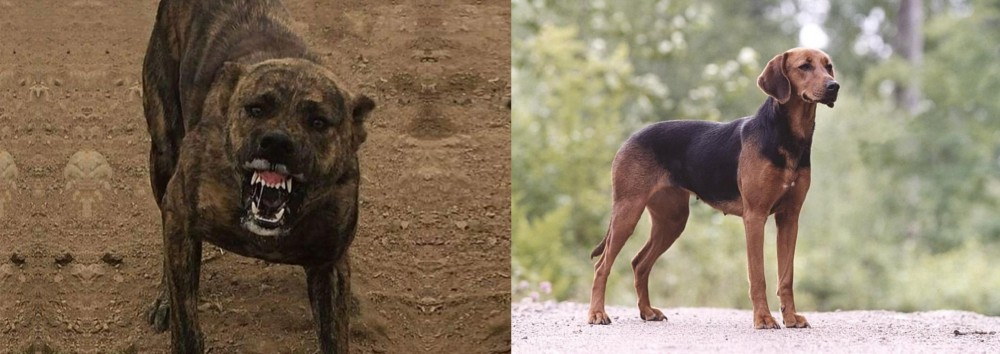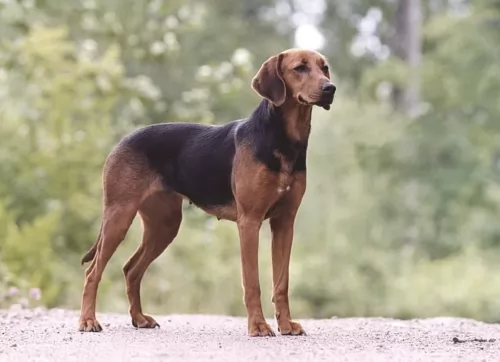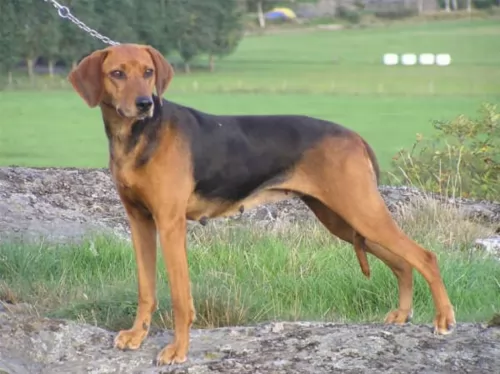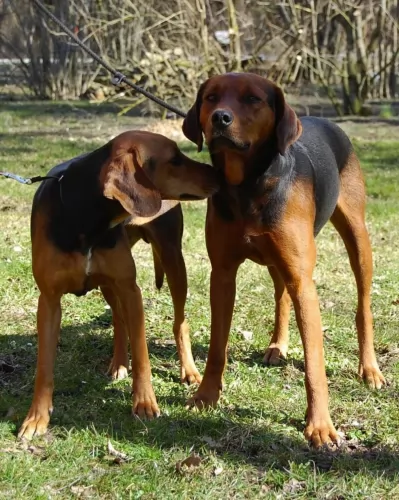 Petzlover
Petzlover Dogo Sardesco is originated from Italy but Schillerstovare is originated from Sweden. Dogo Sardesco may grow 7 cm / 3 inches higher than Schillerstovare. Dogo Sardesco may weigh 20 kg / 45 pounds more than Schillerstovare. Dogo Sardesco may live 3 years less than Schillerstovare. Both Dogo Sardesco and Schillerstovare has almost same litter size. Both Dogo Sardesco and Schillerstovare requires Low Maintenance.
Dogo Sardesco is originated from Italy but Schillerstovare is originated from Sweden. Dogo Sardesco may grow 7 cm / 3 inches higher than Schillerstovare. Dogo Sardesco may weigh 20 kg / 45 pounds more than Schillerstovare. Dogo Sardesco may live 3 years less than Schillerstovare. Both Dogo Sardesco and Schillerstovare has almost same litter size. Both Dogo Sardesco and Schillerstovare requires Low Maintenance.
 This is an ancient working dog breed which hails from the Italian island of Sardinia. When you do research, you find that no one is sure as to this dogs exact origin, and there are a number of theories as to how the dog developed.
This is an ancient working dog breed which hails from the Italian island of Sardinia. When you do research, you find that no one is sure as to this dogs exact origin, and there are a number of theories as to how the dog developed.
Regardless of how the Dogo Sardesco came about, it is a valued companion of farmers in Sardinia, being appreciated for its protective nature.
The dog is a kind of Molosser or Mastiff dog. In the past the dog has been used as a working and hunting dog, and today he is a popular dog in mainland Italy. He is also known as Sardinian Mastiff, Sardinian Molosser and Dogo Sardo.
The Dogo Sardesco isn’t recognized today by international kennel clubs, and breeders on the island of Sardinia have done nothing to form a breed club for the dog.
 The Schillerstövare originated in Sweden, being named after a Swedish farmer, Per Schiller. After he died, the dog was named Schillerstövare in 1907, and was Sweden's first native dog breed.
The Schillerstövare originated in Sweden, being named after a Swedish farmer, Per Schiller. After he died, the dog was named Schillerstövare in 1907, and was Sweden's first native dog breed.
The Swedish Kennel Club recognised this dog in 1907 and it is also recognised by the Federation Cynologique Internationale as well as a number of minor kennels and dog clubs.
The dog has always been used as a hunting dog and the English Foxhound is the e foundation for this breed.
 The dog Sardesco is a medium to large sized dog generally measuring 56 to 68 cm at the withers and weighing roughly 30 to 45 kg.
The dog Sardesco is a medium to large sized dog generally measuring 56 to 68 cm at the withers and weighing roughly 30 to 45 kg.
Because the dog isn’t bred to specific standards, it varies in appearance, but it is a powerful looking dog, being lean and athletic. The dog’s tail is traditionally docked, but with tail docking being frowned upon, the tail is left long and the dog loses its distinctive look.
The head of the dog is large and the ears are also traditionally cropped to be very short. Left naturally, the ears fold down closely to the sides of the head.The eyes are small and amber colored. The coat is short and smooth, but thick, and while it comes in many colors, the more regular color is red, brown, black, grey or brindle.
The Dogo Sardesco becomes a loyal family pet, more so when he has been trained and socialized. Although he is a devoted and affectionate dog, forming particularly strong bonds with his human family, he isn’t recommended for homes where there are young children.
He also doesn’t take too kindly to other pets in the home. This is because they are a strong-willed, dominant breed and might therefore not be a good choice for first-time dog owners.
Because Sardinian breeders have focused on developing an aggressive dog, he has become a dog suspicious of- and aloof with strangers. He is stubborn and self-willed, and to make him more obedient and amicable, he will require training and socialization. He is an alert, intelligent dog and this makes him an excellent watch dog.
The Sardinian Mastiff is an active dog too and won’t do well in a home where the people aren’t interested in exercise. He is the kind of dog that will need to be taken with you on walks, and he will love to spend time running alongside you when you go running or cycling.
He won’t adapt too well to life in the city, particularly when there is just a tiny garden.
 The Schillerstövare is a medium to large sized dog. They’re athletic and muscular.
The Schillerstövare is a medium to large sized dog. They’re athletic and muscular.
Standing at between 53–61cm in height and weighing in the region of 18–25kg, the coat of the dog is fairly short and harsh, with the color being black and tan.Sometimes you’ll see some white markings on the chest and paws.
The head is domed, the eyes brown, bright and alert and the ears of the dog are broad, medium length and floppy. The long tail is carried low or held out when running or alert.
If you allow your Schillerstovare to have puppies, you can expect between 3 to 7.
The Schillerstovare is a calm dog but he can get petty lively when there’s a game to be had. He gets on well with well disciplined children who have been taught to be kind and respectful to animals. He also gets on well with pets in the home. Just like with most other dogs, he will need to be trained and socialized as he is a strong willed, confident, dominant dog.
He is friendly and active but will be somewhat reserved around strangers.These dogs will require a lot of exercise and will need quite a bit of space too. They aren't well suited to small properties in the city. He will need a daily walk but also a chance to get off his leash and run free in the park. Other forms of exercise such as hikes, ball game and swimming will delight him.
 The Dogo Sardesco has always performed his role as a working dog well, and this is a reliable watch dog as well as the dog takes his job of guarding his human family seriously.
The Dogo Sardesco has always performed his role as a working dog well, and this is a reliable watch dog as well as the dog takes his job of guarding his human family seriously.
With his aggressive temperament, he has appeared on the list of banned breeds, and this is why he isn’t an ideal choice for homes where there are small children, as some small children haven’t been taught how to treat a dog with respect.
However, when properly trained and socialized he becomes an excellent companion dog. He has an intimidating look about him, but when he is with his human family, another side comes out and he is affectionate, loving and protective.
 Schillerstovares are social, loving, friendly, loyal dogs who enjoy being around their human family. He’s going to need a lot of exercise, both mental and physical to keep him from boredom and frustration.
Schillerstovares are social, loving, friendly, loyal dogs who enjoy being around their human family. He’s going to need a lot of exercise, both mental and physical to keep him from boredom and frustration.
He will rely on you for at least a daily walk. He is strong-will and confident and will do well in a family where they are active and where they are firm, patient, kind and consistent in their behaviour towards him because then he ticks all th right boxes for being a splendid pet.
 The Dogo Sardesco is a relatively healthy breed who is unlikely to suffer with ailments common to dogs, but nonetheless there are some diseases or conditions that you might want to be aware of with your dog.
The Dogo Sardesco is a relatively healthy breed who is unlikely to suffer with ailments common to dogs, but nonetheless there are some diseases or conditions that you might want to be aware of with your dog.
Skeletal and visual problems can occur in this breed. Both hip- and elbow dysplasia are common orthopedic disorders in dogs and they can cause a lot of pain and discomfort and even cause lifelong disability.
Genes and environmental factors play a part in your dog developing this disease.If he has been diagnosed as having hip or elbow dysplasia, get your dog to the vet as there are treatments which can at least make your pet a lot more comfortable.
Remember that feeding your puppy Dogo Sardesco too much food which is particularly high in calories can mean him growing too fast, and this can contribute to this hip dysplasia problem.
 Even though your Schillerstovare is a healthy dog breed, hip dysplasia is a common dog disease that many dogs get.
Even though your Schillerstovare is a healthy dog breed, hip dysplasia is a common dog disease that many dogs get.
This is a skeletal disease when a dog’s hip joints become partially dislocated. It can be very difficult for your dog to get around, and he can also develop arthritis. It gets very sad when your dog doesn’t even want to participate in games anymore.
 Dog owners who don’t like the idea of spending too much money on grooming will appreciate that the Dogo Sardesco is a very low maintenance breed, and that a good brushing twice a week will keep the dog’s coat shiny and healthy.
Dog owners who don’t like the idea of spending too much money on grooming will appreciate that the Dogo Sardesco is a very low maintenance breed, and that a good brushing twice a week will keep the dog’s coat shiny and healthy.
As with all other dogs, he will need to have his teeth brushed to remove plaque build up. Not only does plaque lead to dental disease, but bad teeth can lead to other health issues too.
Nail clipping will also be necessary if your pet doesn’t wear the nails down naturally from getting to run on a hard surface from time to time.
 With his short coat, the Schillerstovare is considered a low maintenance dog and requires a minimal amount of grooming. Brushing should be done twice a week to remove loose hair. The harsh outer coat seems to repel dirt and dust.
With his short coat, the Schillerstovare is considered a low maintenance dog and requires a minimal amount of grooming. Brushing should be done twice a week to remove loose hair. The harsh outer coat seems to repel dirt and dust.
Trim your pet’s nails, check inside his ears for signs of redness, make sure his eyes are bright and clear and make sure he doesn’t have any unusual lumps on him.
Make sure his vaccines are up to date to avoid deadly canine diseases. Take him to the vet when you suspect he isn’t his normal self.
Dogs, just like humans, do well on good, nutritious diets. Feed a human lots of junk food and sweets and they’ll grow up to be obese and unhealthy. That's exactly how it is with dogs too. Some of the best commercially manufactured dog foods are convenient and they can be good if you look at the top brands. Look for ones that cater for your dog’s age, size, breed and activity levels. This dry kibble can be made more inviting for your pet when you include some homemade food.
Dogs just want simplicity so that they don’t battle with digestive problems. Boiled chicken, sweet potatoes, brown rice or pasta, carrots and spinach will be wonderful for him when you chop the food up and add it into the dry kibble twice a week. See his tail wag and his brown eyes light up when he smells this treat. Some raw meat added up occasionally will also contribute to your pet’s heath.
Make sure he is never without a constant supply of fresh, cool water.